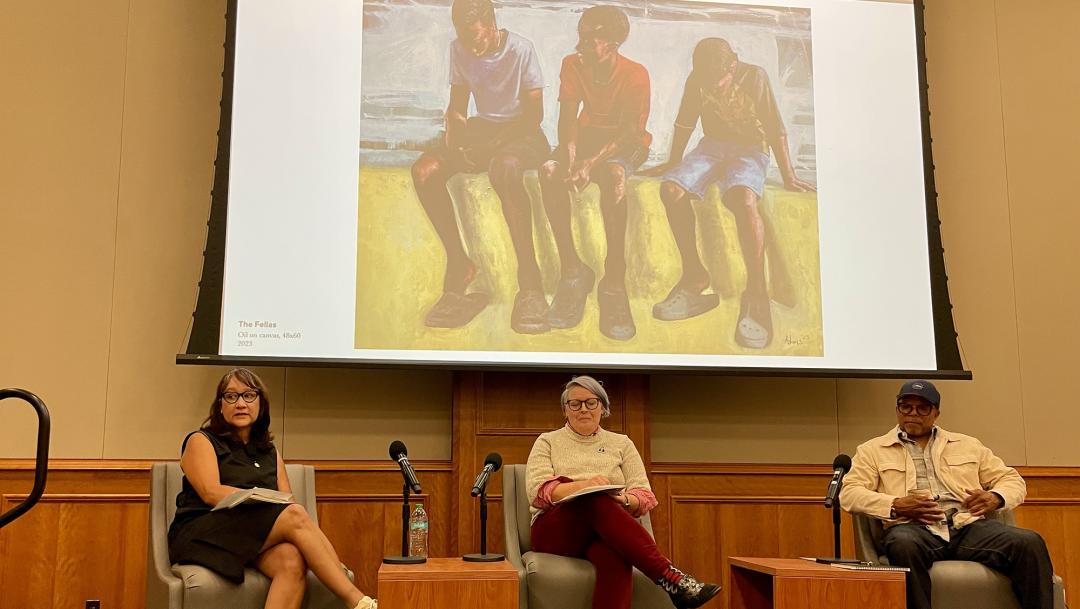
MARCH Director Jillian Sayre, center, moderates a conversation with Mercy Romero and artist Alonzo Adams in Camden, New Jersey.
Rutgers-Camden fetes Chancellor’s Distinguished Visiting Scholar Mercy Romero
One thing you can say about Rutgers University-Camden Chancellor’s Distinguished Visiting Scholars: They are kept busy. Or, at least the latest designee, Mercy Romero, was on the go-go-go when she returned to her New Jersey hometown in October for multiple events.
The UC Irvine associate professor of criminology, law and society, who joined the School of Social Ecology faculty last year through UCI’s Black Thriving Initiative and Faculty Cluster Hiring in Poetic Justice, delivered a keynote address Oct. 2 at the Rutgers Center for Digital Studies at Johnson Park Library in Camden.
Romero’s topic was doing research in and about the Rust Belt town that resulted in Toward Camden (Duke University Press, 2021). Her award-winning book centers on the largely African American and Puerto Rican Cramer Hill neighborhood in New Jersey. Revisiting lost and empty houses — her family’s house, the Walt Whitman House, and the landscape of a vacant lot — Romero engages with the aesthetics of fragment and ruin, resisting narratives of Camden that are inextricable from crime and decline, traveling between what official reports say and what the city’s vacant lots withhold.
During the keynote address before Rutgers undergraduate and graduate students, faculty, staff and members of the surrounding community, Romero shared her perspective, both as a scholar and former resident of the city, on how academics can engage in research in and about communities.
Immediately after speaking, she participated in a hands-on workshop in the library that used passages from Toward Camden as inspiration for telling one’s own stories that explore doing research in and around specific communities, urban spaces and abandoned lots. The workshop was presented in partnership with the Center for Urban Research and Education (CURE) and the Office of the Chancellor at Rutgers-University Camden.
The Mid-Atlantic Regional Center for Humanities (MARCH) Book Club dedicated its Oct. 6 meeting at the Rutgers-Camden Campus Center to Toward Camden. During the first hour of the public event, participants who’d received free copies of the book held discussions about it in small groups to identify questions they went on to explore with Romero. The author joined the audience for the second half of the evening, when she spoke about what inspired her to write Toward Camden, her research process and important ideas that emerged from writing about and in her hometown. After taking questions from the crowd, Romero signed copies of her book.
The Rutgers-Camden Center for the Arts and MARCH presented Romero and New Jersey artist Alonzo Adams for an interdisciplinary conversation Oct. 10 in the Campus Center’s Multipurpose Room. The painter, who was one of the first inductees into the Rutgers African American Alumni Alliance’s Hall of Fame, and the scholar considered how we engage with, represent and share stories from different communities.
Open to the public, the conversation was followed by a reception in the Rutgers-Camden Center for the Arts' Stedman Gallery, where Adams’ exhibit “These Eyes Have Seen” and a display based on Toward Camden were featured.
Finally, on Oct. 12, Romero was the star attraction at “Writing About Home: Cooper Street Workshop with the Writers House.” Located on Cooper Street, the Writers House hosted and presented the public event with the Rutgers-Camden Chancellor’s Office and Voces de la comunidad, a project that uses bilingual resources to bridge the gap between climate scholarship and the local community.
The aim of “Writing About Home” was to bring community members together to think about how we engage with place, and specifically the places we call “home.” Romero seized the opportunity to talk about her experiences writing about Camden, offering her expertise in thinking about our connections to place and how those places are filled with histories and present uses that are often ignored or underrepresented.
“It was such a great experience,” said the visiting scholar upon returning to California. “I'm still processing how rich it was.”
— Matt Coker